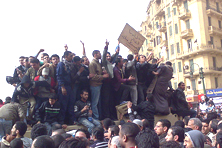
Egypt: History is Being Made—Without the U.S.
Source: The Progressive
This year may very well prove to be the most memorable in modern Arab history. Too bad that the United States is on the wrong side.
I have written a soon-to-be-published book on Islam and nonviolence that deals with mass protest in the Middle East, but Tunisian and Egyptian youth have already made the book a bit dated by deciding that this year was the year they had enough.
Tunisia itself was momentous. It was the first time in the recent past that an Arab dictator had been toppled by people power. But as significant as this was, Tunisia is a relatively small country and on the margins of the Arab world, geographically and culturally.




